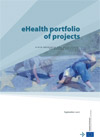 The aim of Information and Communication Technologies (ICT) for Health (also known as eHealth) is to significantly improve the quality, access and efficacy of healthcare. ICT for Health describes the application of information and communication technologies across the whole range of functions that affect the health sector. The European Commission has been supporting research activities in ICT for Health for almost two decades. This has placed Europe in a leading position in the use of regional health networks, electronic health records in primary care and deployment of health cards.
The aim of Information and Communication Technologies (ICT) for Health (also known as eHealth) is to significantly improve the quality, access and efficacy of healthcare. ICT for Health describes the application of information and communication technologies across the whole range of functions that affect the health sector. The European Commission has been supporting research activities in ICT for Health for almost two decades. This has placed Europe in a leading position in the use of regional health networks, electronic health records in primary care and deployment of health cards. This booklet presents a compilation of the research projects managed by the ICT for Health Unit of the Information Society and Media Directorate General. The projects are funded under the Sixth Framework Programme for Research Development and Demonstration (FP6). It also explores in brief detail the proposed and potential future directions of the ICT for Health Unit, particularly under the umbrella of the Seventh Framework Programme (FP7).
The projects are grouped in three broad thematic areas, Personal health management systems and services based on biosensors, Tools for health professionals and Biomedical Informatics.The projects are listed in alphabetical order and each thematic area is identifiable by a colour.
Download:
- Cover / Introduction (.pdf, 965KB)
- Projects (.pdf, 3,4MB)
- Studies / Annexes (.pdf, 1,8MB)
For further information:
ICT for Health
European Commission - Information society and Media DG
Office: BU31 06/73 B-1049 Brussels
Email: This email address is being protected from spambots. You need JavaScript enabled to view it.
Tel: +32 2 296 41 94
Fax: +32 2 296 01 81
http://europa.eu/information_society/eHealth